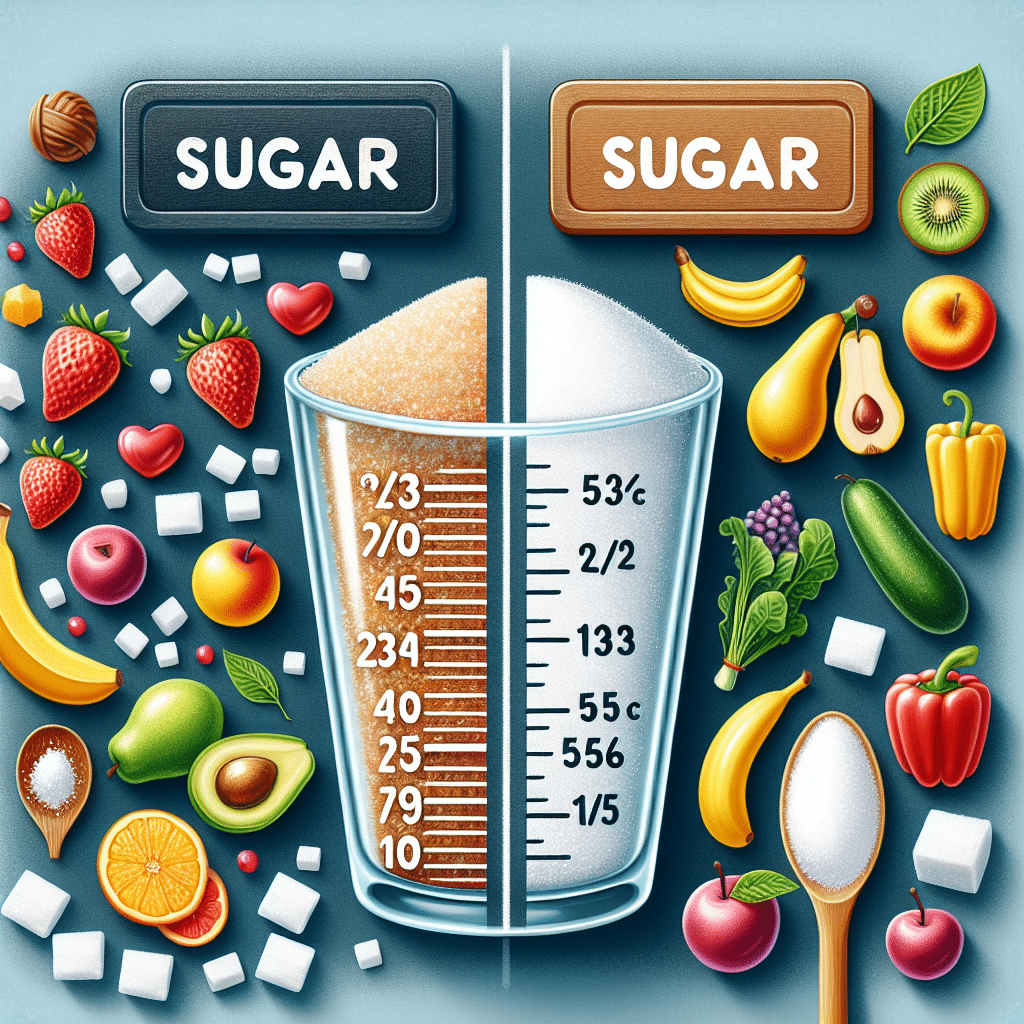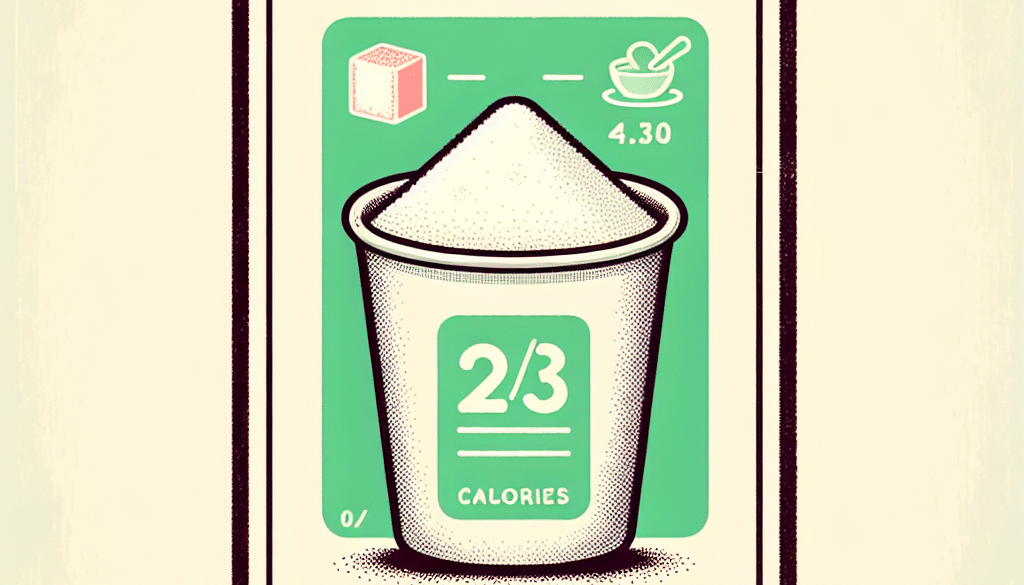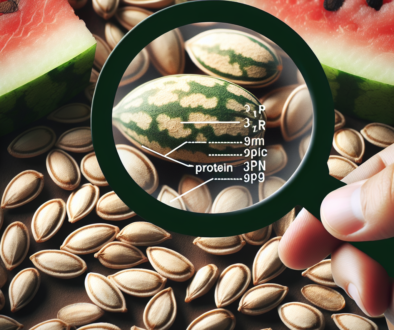2/3 Cup Sugar Calories: Sweet Indulgence, Smart Choices
-
Table of Contents
- 2/3 Cup Sugar Calories: Navigating Sweet Indulgence and Smart Choices
- Understanding Sugar and Its Caloric Content
- The Impact of Sugar on Health
- Smart Choices for Sweet Indulgence
- Case Studies and Statistics: The Sugar Reduction Movement
- Calorie-Smart Recipes and Substitutions
- Conclusion: Balancing Sweetness and Health
- Discover ETprotein’s Protein Products
2/3 Cup Sugar Calories: Navigating Sweet Indulgence and Smart Choices

Indulging in sweet treats is a universal pleasure, but it often comes with a side of calorie concerns. Understanding the caloric content of sugar is essential for those who wish to enjoy their favorite desserts while maintaining a balanced diet. In this article, we’ll delve into the specifics of the calories found in 2/3 cup of sugar and explore how to make smart choices when it comes to sweet indulgence.
Understanding Sugar and Its Caloric Content
Sugar, in its most common form (sucrose), is a simple carbohydrate that provides a quick source of energy. One teaspoon of granulated sugar contains about 16 calories. When we scale that up to 2/3 cup, which is equivalent to approximately 10.67 tablespoons, we’re looking at a total of around 170 calories. This caloric value can vary slightly depending on the type of sugar and its density.
The Impact of Sugar on Health
While sugar can be part of a balanced diet, excessive consumption has been linked to various health issues, including obesity, type 2 diabetes, and heart disease. The American Heart Association recommends limiting added sugars to no more than 6 teaspoons (25 grams) per day for women and 9 teaspoons (38 grams) for men. Considering that 2/3 cup of sugar far exceeds these recommendations, it’s crucial to consume it mindfully.
Smart Choices for Sweet Indulgence
Enjoying sweets doesn’t have to mean overindulging in sugar. Here are some tips for making smarter choices:
- Portion Control: When baking or preparing desserts, consider reducing the amount of sugar in the recipe. Often, you can cut the sugar by a third without significantly affecting taste or texture.
- Alternative Sweeteners: Explore natural sweeteners like stevia, erythritol, or monk fruit, which can provide sweetness without the added calories.
- Whole Foods: Opt for whole fruits to satisfy your sweet tooth. They offer natural sugars along with fiber, vitamins, and minerals.
- Dark Chocolate: Choose dark chocolate with a high cocoa content as a healthier alternative to milk chocolate. It contains less sugar and more antioxidants.
Case Studies and Statistics: The Sugar Reduction Movement
Many food manufacturers are responding to consumer demand for lower-sugar options. For example, a popular cereal brand reduced the sugar content in its products by 30% while maintaining taste by adding other flavor-enhancing ingredients. Additionally, a study published in the Journal of Public Health found that a 20% reduction in sugar content in packaged foods could prevent 2.48 million cardiovascular disease events and 490,000 cardiovascular deaths in the U.S. over the lifetime of the adult population.
Calorie-Smart Recipes and Substitutions
Here are some calorie-smart recipes and substitutions that can help you enjoy sweets without the guilt:
- Applesauce for Sugar: In baking, use unsweetened applesauce to replace sugar. A 1:1 ratio works well for most recipes.
- Avocado Chocolate Mousse: Blend ripe avocados with cocoa powder, a touch of honey, and vanilla extract for a creamy, low-sugar dessert.
- Yogurt Parfaits: Layer Greek yogurt with fresh berries and a drizzle of honey for a sweet treat that’s lower in sugar and higher in protein.
Conclusion: Balancing Sweetness and Health
In conclusion, while 2/3 cup of sugar adds significant calories to your diet, there are many ways to enjoy sweet flavors while making smart choices. By understanding the impact of sugar on health, practicing portion control, exploring alternative sweeteners, and trying calorie-smart recipes, you can indulge in sweetness without compromising your well-being.
Discover ETprotein’s Protein Products
If you’re looking to balance your sweet indulgences with healthier options, consider incorporating protein-rich foods into your diet. ETprotein offers a range of high-quality plant-based protein powders that can be a great addition to your nutrition regimen. Whether you’re looking for a post-workout shake or a nutritious snack, their products provide a convenient and tasty way to increase your protein intake.
About ETprotein:
ETprotein, a reputable watermelon seed protein Chinese factory manufacturer and supplier, is renowned for producing, stocking, exporting, and delivering the highest quality organic bulk vegan protein and plant proteins. They include Organic rice protein, clear rice protein, pea protein, clear pea protein, watermelon seed protein, pumpkin seed protein, sunflower seed protein, mung bean protein, peanut protein etc. Their offerings, characterized by a neutral taste, non-GMO, allergen-free attributes, cater to a diverse range of industries. They serve nutraceutical, pharmaceutical, cosmeceutical, veterinary, as well as food and beverage finished product distributors, traders, and manufacturers across Europe, USA, Canada, Australia, Thailand, Japan, Korea, Brazil, and Chile, among others.
ETprotein specialization includes exporting and delivering tailor-made protein powder and finished nutritional supplements. Their extensive product range covers sectors like Food and Beverage, Sports Nutrition, Weight Management, Dietary Supplements, Health and Wellness Products, and Infant Formula, ensuring comprehensive solutions to meet all your protein needs.
As a trusted company by leading global food and beverage brands and Fortune 500 companies, ETprotein reinforces China’s reputation in the global arena. For more information or to sample their products, please contact them and email sales(at)ETprotein.com today.














